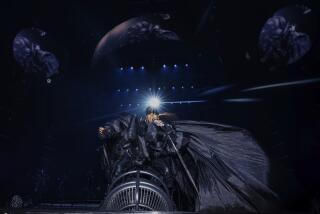Dua Lipa, with some help and inspiration from Madonna, revives the remix album
- Share via
Dua Lipa didn’t need to put a song called “Love Is Religion” on her new remix album to conjure memories of Madonna.
For one thing, the English pop singer teamed with the Blessed Madonna, a widely respected DJ known for her soulful-brainy dance music, to rework the songs from Lipa’s excellent 2020 LP “Future Nostalgia.” Also: Madonna herself appears in a fresh take on “Levitating,” one of several high-profile guest stars (along with Missy Elliott and Gwen Stefani) that demonstrate the 25-year-old Lipa’s speedy ascent to pop’s upper ranks.
Even minus all that, though, “Club Future Nostalgia” calls to mind “The Immaculate Collection”: Like that 1990 classic — a greatest-hits comp sliced and diced by Madonna and producer Shep Pettibone to resemble a killer club set — Lipa’s record uses carefully designed pop tunes as raw material for a breathless new creation.
Thought “Kiss and Make Up” was good as a throbbing collaboration with K-pop girl group Blackpink? Check out the women’s swaggering vocals laid over the indelible bass lick from Herb Alpert’s “Rise,” as it is here. It’s a clever redo as thorough — and as funky — as Pettibone’s house-inspired version of “Express Yourself.”

The difference is that 30 years after Madonna trained us to think of female pop stars in terms of personal narrative, Lipa stands alone among her contemporaries as an artist whose music says little about her celebrity. Nobody listens to Lipa to get the latest on some feud or another; nobody scours her records for revelations about her ex-boyfriends.
What do we even know about Dua Lipa — or Dula Peep, as many of her fans call her (after Wendy Williams famously mangled the singer’s name on her talk show)? The hot gossip could fill a page or two, compared to the reams for Taylor Swift or Lady Gaga or Katy Perry.
That might mean she’s less than thrilling on social media, but Lipa — named best new artist at the Grammy Awards in 2019 — can get away with it because she’s a magnificent singer, with a low, smoky voice that’s always suggesting she knows more than she’s letting on. If you missed it, go back to the appearance she made this year on a remix of “Sugar” by the boy band Brockhampton; she sounds like Anne Bancroft in “The Graduate.”
Her singing is just as vivid on “Club Future Nostalgia.” Plenty of pop acts, including Gaga and Doja Cat, have been looking back recently to the glory days of disco — a curious development at a moment when actual dancing in actual clubs is more or less out of the question thanks to the COVID-19 pandemic.

Yet Lipa’s dance-floor excursion plays better than the rest because it’s so single-mindedly devoted to the job at hand; you’re never distracted from the beats to ponder the vagaries of her personal life.
And the beats are consistently banging. With help from a varied assortment of DJs and producers — from Top 40 regulars like Mark Ronson and Stuart Price to esteemed veterans such as Larry Heard and Masters at Work — Lipa and the Blessed Madonna blend more than a dozen tracks into a nearly hour-long megamix that keeps reframing Lipa’s voice: warm and playful in “Good in Bed,” sensual yet longing in “Pretty Please,” colder and more aggressive in “Hallucinate.”
The cameos by Lipa’s predecessors are fun, never more so than when Elliott instructs some dude in “Levitating” to “suck my breasts like Betty Boop.” In the same song, Madonna goes all ray-of-light mystical about energy written in the stars, while Stefani lends her panting coo to an updated “Physical.”
But the singer gets more mileage out of weaving snippets of old tunes among her own. When Stevie Nicks shows up out of nowhere to chant the staticky chorus of “Stand Back,” you’re reminded of how a great song always finds life outside its immediate context.
More to Read
The biggest entertainment stories
Get our big stories about Hollywood, film, television, music, arts, culture and more right in your inbox as soon as they publish.
You may occasionally receive promotional content from the Los Angeles Times.











